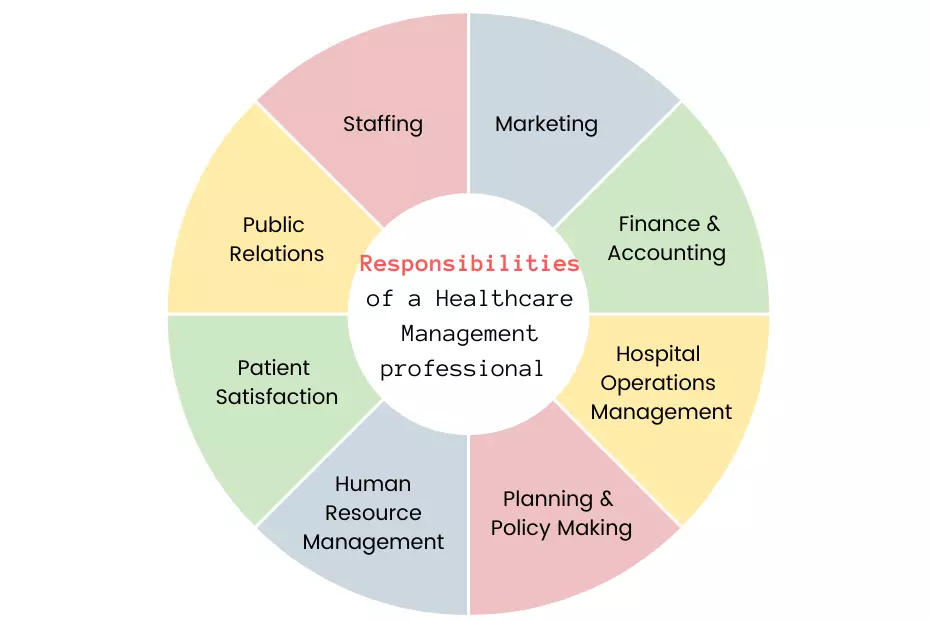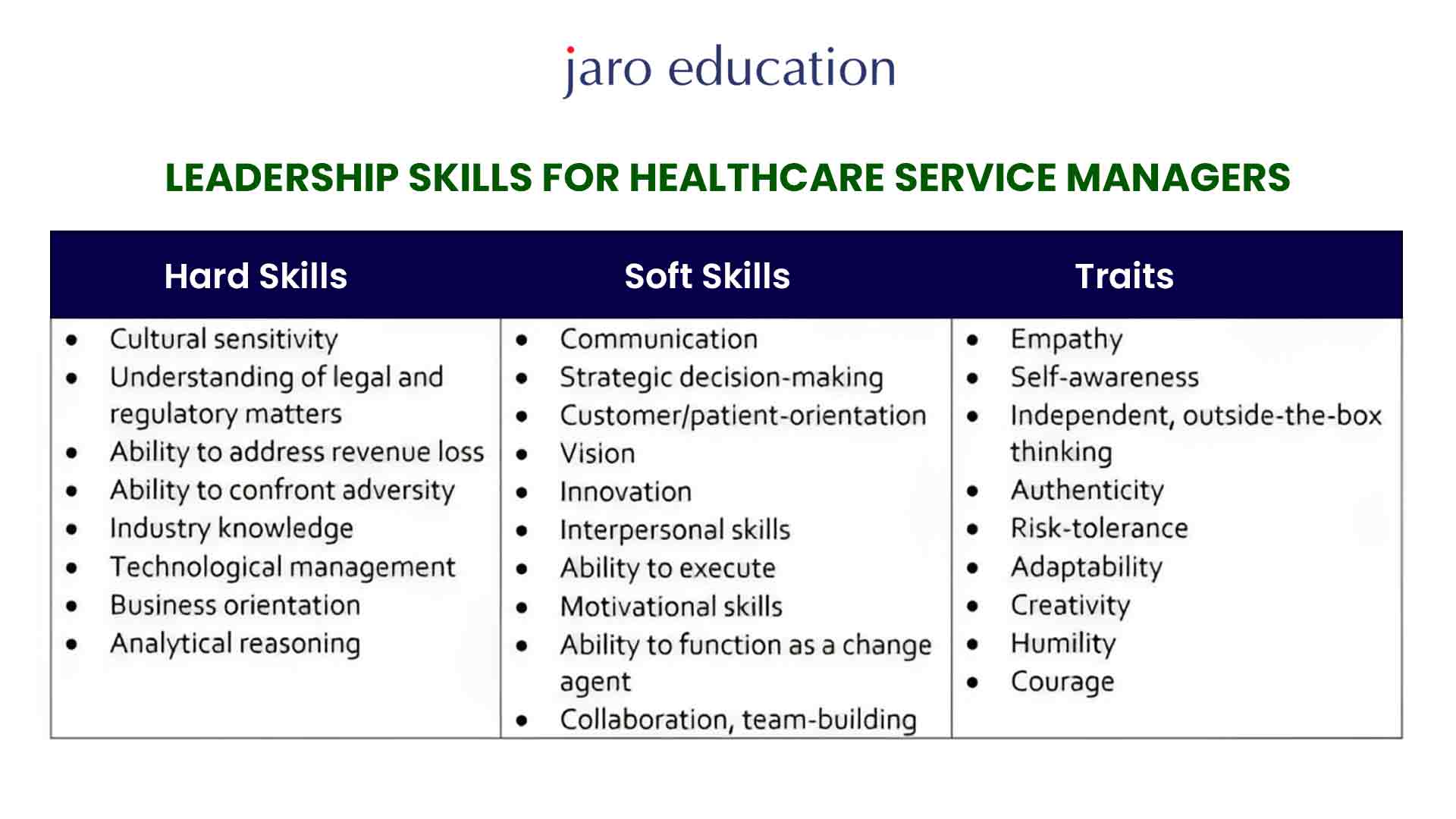What is Healthcare Management? Trends And Career Opportunities
Table of Contents

- jaro education
- 28, November 2024
- 11:00 am
The healthcare sector stands as one of the most dynamic and impactful industries globally. From technological advancements to the rising focus on patient-centric care, the landscape of healthcare management is rapidly evolving. At the forefront of this transformation are skilled professionals who bridge the gap between medical expertise and organisational efficiency. But what exactly is healthcare management, and why is it so critical to the future of global health?
In this blog, we will explore the multifaceted world of healthcare leadership, career opportunities within the field, and an exciting educational programme from IIT Delhi that can equip you to excel in this domain.
What Is Healthcare Management?
Healthcare management involves the administration, leadership, and overall management of healthcare organisations, including hospitals, clinics, and other medical facilities. It covers a wide array of responsibilities, such as financial planning, human resources, policy development, patient care coordination, and the integration of advanced technologies.
In today’s world, where healthcare systems face mounting pressures, effective management ensures patients receive high-quality care while institutions maintain operational excellence. This dual focus makes healthcare leadership an indispensable aspect of modern healthcare systems.

*CareerGuide
Why Is Healthcare Management Important?
The importance of healthcare management transcends the confines of hospital walls. It plays a pivotal role in ensuring healthcare systems are efficient, patient-focused, and financially sustainable. Here are some key reasons why healthcare leadership is indispensable:
- Improved Patient Outcomes: Proper management enhances patient care by streamlining processes, reducing waiting times, and adopting innovative treatment approaches.
- Operational Efficiency: Effective management reduces resource wastage and optimises costs without compromising quality.
- Integration of Technology: Healthcare managers are instrumental in implementing advanced technologies such as telemedicine and electronic health records.
- Workforce Coordination: Managing diverse teams of doctors, nurses, technicians, and administrators requires specialised skills.
- Regulatory Compliance: Navigating healthcare regulations and policies is a critical aspect of healthcare leadership.
Healthcare Management Careers: Opportunities and Salaries
The healthcare sector offers numerous opportunities for professionals with the right qualifications. Whether you’re drawn to operations, strategy, or technology, healthcare management offers a rewarding career path.
1. Diverse Healthcare Management Jobs
Professionals can explore various roles, such as:
- Hospital Administrator: Oversee the day-to-day operations of a hospital, including budgeting and strategic planning.
- Clinical Manager: Supervise specific departments, such as oncology or cardiology.
- Health Information Manager: Manage patient data systems and ensure compliance with data privacy laws.
- Healthcare Consultant: Advise healthcare organisations on improving operational efficiency and patient outcomes.
- Public Health Manager: Develop community health programmes to address public health challenges.
2. Competitive Salaries in Healthcare Management
Healthcare management roles are financially rewarding. Entry-level positions in India offer a starting healthcare management salary of approximately ₹5–7 lakh per annum, while senior professionals or consultants earn upwards of ₹25 lakh annually, depending on their experience and expertise.
Educational Pathways: Building a Career in Healthcare Management
Aspiring healthcare managers often pursue formal education to gain the skills necessary for success. Here are some popular academic pathways:
- PG Diploma in Healthcare Management: This programme is ideal for professionals seeking foundational knowledge in healthcare operations and strategy. It provides a stepping stone into the industry.
- Master’s Degrees in Healthcare Management: Advanced Master’s programmes, such as the MBA in Hospital Administration and Healthcare Management by Dr. DY Patil Vidyapeeth, Pune, prepare individuals for leadership roles by covering policy development, financial management, and operational strategies.
- Specialised Executive Programmes: Tailored for working professionals, these programmes such as those offered by IIM healthcare management departments offer in-depth knowledge of niche areas such as entrepreneurship and digital healthcare.
Essential Skills for a Successful Career in Healthcare Leadership
Success in healthcare leadership requires a blend of technical and interpersonal skills. Here are the key attributes needed:
- Leadership and Team Management: Inspiring and managing teams to achieve organisational goals is a fundamental aspect of healthcare leadership.
- Strategic Thinking: Healthcare managers must analyse complex situations and make informed decisions.
- Strong Communication Skills: Clear communication is essential when liaising between medical staff, patients, and administrative teams.
- Technological Proficiency: Familiarity with healthcare management tools and emerging technologies such as artificial intelligence is increasingly important.
- Ethical Judgment: Managers often face ethical dilemmas, requiring a balance between business objectives and patient welfare.

Emerging Trends in Healthcare Management
The healthcare sector is undergoing significant transformation, and professionals must stay ahead of these changes to remain competitive.
1. Digital Healthcare Transformation
Technological advancements such as telemedicine, artificial intelligence, and blockchain are revolutionising healthcare delivery. Remote monitoring and mobile health apps are making healthcare more accessible to patients.
2. Focus on Value-Based Care
The shift from fee-for-service to value-based care models rewards providers for delivering quality outcomes rather than high volumes of services.
3. Sustainable Healthcare Practices
As global attention turns to environmental sustainability, healthcare organisations are adopting green practices, such as energy-efficient facilities and eco-friendly waste management systems.
4. Personalised Medicine
Advancements in genomics are enabling tailored treatments based on individual genetic profiles, heralding a new era of personalised healthcare.
5. Global Health Challenges
Healthcare managers play a vital role in addressing global challenges such as pandemics, health inequities, and access to care in underserved regions.
Introducing the Executive Programme in Healthcare Entrepreneurship and Management by IIT Delhi
For professionals aspiring to make a mark in healthcare management, specialised programmes offer invaluable insights and skills. The Executive Programme in Healthcare Entrepreneurship and Management, offered by CEP, IIT Delhi, with Jaro Education as the service partner, is a prime example of such an opportunity.
Why Choose This Programme?
-
- Comprehensive Curriculum: The course covers healthcare operations, financial management, policy-making, and entrepreneurial strategies, equipping participants with a well-rounded understanding of the field.
- Industry Expertise: Delivered by experienced faculty and healthcare leaders, the programme combines academic rigour with practical insights.
- Flexibility: Designed for working professionals, the programme allows participants to balance learning with their existing commitments.
- Career Advancement: Graduates can access lucrative healthcare management jobs and advance into leadership positions within top organisations.
Conclusion
The field of healthcare leadership is both dynamic and rewarding, offering professionals the chance to lead meaningful change in one of the world’s most essential industries. Whether you are drawn by the allure of innovation, the promise of improving patient care, or the prospect of a competitive healthcare management salary, this field is ripe with opportunities.
By enrolling in a specialised programme like the Executive Programme in Healthcare Entrepreneurship and Management by IIT Delhi, you can gain the skills and knowledge needed to excel. Invest in your future and step confidently into the world of healthcare management—where your leadership can make a difference.
Frequently Asked Questions
Healthcare management involves the administration and oversight of healthcare organisations such as hospitals, clinics, and nursing homes. It ensures the effective delivery of healthcare services by managing resources, staff, finances, and operations. The goal is to improve patient outcomes, enhance operational efficiency, and ensure compliance with healthcare laws and standards. Healthcare management professionals act as a bridge between medical staff and administrative goals, balancing the needs of patients and the organisation.
The scope of healthcare management is vast, spanning multiple domains within the healthcare ecosystem. Key areas include:
-
- Hospital Administration: Managing hospital operations, resource allocation, and patient care services.
- Public Health Management: Planning and executing health initiatives for communities.
- Health Information Systems: Overseeing the use of digital tools like electronic health records (EHRs) and telemedicine.
- Policy Development: Formulating strategies to comply with healthcare regulations and laws.
- Pharmaceutical and Medical Technology Management: Managing supply chains, drug approvals, and device integrations.
- Consultancy and Entrepreneurship: Providing advisory services or starting healthcare-related ventures.
Healthcare management is a growing field, with opportunities in private healthcare institutions, government agencies, non-profits, and multinational corporations.
Salaries in healthcare management vary based on factors like location, qualifications, experience, and role. In India, entry-level professionals can earn around ₹5–7 lakh per annum. Experienced professionals, especially in leadership roles such as Chief Executive Officer (CEO) or Chief Operations Officer (COO) of large healthcare organisations, can earn upwards of ₹50 lakh to ₹1 crore annually. Globally, salaries for top executives in healthcare management, especially in developed nations, can range from $200,000 to $500,000 per year.
Medical management focuses on overseeing and improving clinical operations and patient care processes within healthcare organisations. Its key roles include:
-
- Clinical Coordination: Ensuring that medical services are delivered efficiently and align with organisational goals.
- Quality Assurance: Monitoring and improving the quality of care provided to patients.
- Resource Optimisation: Managing the allocation of medical resources such as staff, equipment, and facilities.
- Compliance: Ensuring adherence to healthcare laws, ethical standards, and accreditation requirements.
- Strategic Planning: Developing strategies for improving patient care, integrating new technologies, and expanding services.
Medical management plays a crucial role in bridging clinical expertise and administrative efficiency, ensuring that healthcare organisations achieve optimal outcomes for patients and stakeholders alike.









